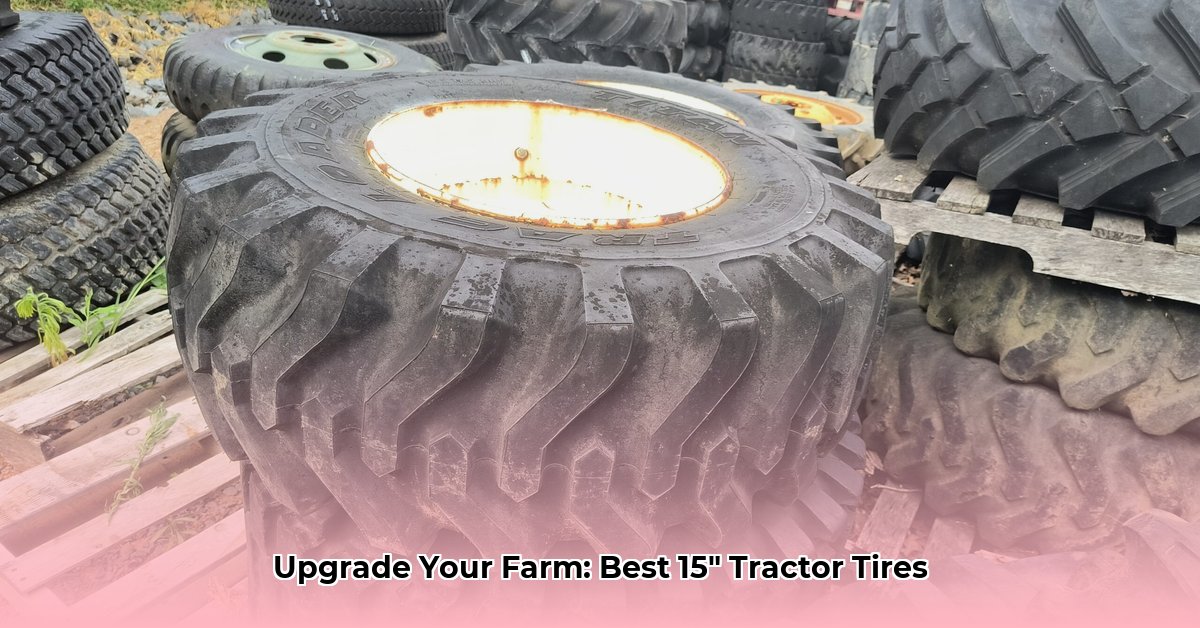
15-Inch Tractor Tires: A Comprehensive Guide for Sustainable Farming
Choosing the right 15-inch tractor tires is crucial for efficient and sustainable farming practices. This informational report offers actionable steps to help farmers, manufacturers, and policymakers make informed decisions. The increasing demand for smaller tractors necessitates a thorough understanding of tire selection, maintenance, and responsible disposal. For more information on other tractor tire sizes, check out this helpful resource: 6-00-12 tractor tires.
The Current State of the 15-Inch Tractor Tire Market
The surge in small-scale farming has significantly increased the demand for 15-inch tractor tires. However, this growth presents challenges: a lack of standardized sustainability metrics makes it difficult to compare tire options effectively. Further complicating matters are supply chain vulnerabilities, impacting both availability and pricing. This uncertainty necessitates a more informed and strategic approach to tire selection.
Key Challenges:
- Lack of Standardized Sustainability Metrics: A critical gap exists in the market's ability to objectively assess and compare the environmental impact of different 15-inch tractor tires.
- Supply Chain Volatility: Global events and material shortages can disrupt supply chains, leading to price fluctuations and potential scarcity.
- Limited Information on Durability and Lifespan: Consistent data comparing the longevity and durability of various tire models is scarce, hindering informed purchasing decisions.
A Step-by-Step Guide to Selecting Sustainable 15-Inch Tractor Tires
Choosing the right tires involves a multifaceted approach:
Assess Your Farming Needs: Analyze your soil type, typical workload, and budget constraints to determine the required tire specifications. Consider factors such as traction needs, load capacity requirements, and operating hours.
Understand Tire Specifications: Examine key characteristics: tread patterns (ribbed for hard surfaces, lug for loose soil); load capacity (ensure it aligns with your tractor's weight and hauling capacity); and speed ratings.
Conduct Thorough Comparisons: Evaluate different brands and models, focusing on their durability claims, expected lifespan, and any eco-friendly certifications. Prioritize brands with transparent manufacturing processes and a commitment to sustainability.
Utilize Farmer Feedback: Leverage online reviews and discussions to benefit from the firsthand experiences of others. Real-world feedback provides valuable insights often missing from manufacturer specifications.
Explore Local Sourcing: Whenever feasible, support local tire suppliers to minimize transportation distances and reduce your carbon footprint. This contributes to a more sustainable supply chain locally.
Plan for Responsible Disposal: Research tire recycling programs in your area. Responsible end-of-life management is crucial for minimizing environmental impact.
Sustainability in 15-Inch Tractor Tires: A Call for Transparency
Sustainability is not merely a trend but a critical factor affecting the long-term viability of small-scale agriculture. Seek out tires manufactured with recycled materials or those from companies demonstrably committed to sustainable practices.
"The lack of standardized sustainability metrics in the 15-inch tractor tire market represents a significant hurdle. This makes it challenging for farmers to make truly informed, environmentally conscious choices," says Dr. Anya Sharma, Agricultural Sustainability Expert at the University of California, Davis.
The need for widely accepted sustainability certifications is paramount to fostering transparency and informed decision-making. This will simplify the process for farmers in choosing tires that align with their sustainability goals.
Collaborative Action for a Sustainable Future
Achieving a truly sustainable 15-inch tractor tire market requires concerted effort from multiple stakeholders:
| Stakeholder Group | Key Actions |
|---|---|
| Farmers | Advocate for standardized sustainability metrics, actively seek out sustainable options. |
| Manufacturers | Increase transparency in supply chains, invest in sustainable materials and processes. |
| Policymakers/Governments | Develop incentives for sustainable practices, implement responsible tire disposal regulations. |
| Research Institutions | Conduct lifecycle assessments, develop standardized sustainability measurement tools. |
Conclusion: Paving the Way for Sustainable Farming
The future of sustainable agriculture depends on responsible practices throughout the entire supply chain. The 15-inch tractor tire market must prioritize transparency, standardization, and supply chain resilience. Continued research and development, along with collaborative efforts, are essential to ensure a sustainable path for small-scale farming. The demand is there; now we need collective action to meet it responsibly.